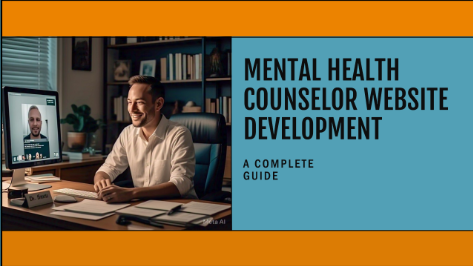When seeking mental health support, the first interaction a potential client has with a counselor is often through their website. A poorly designed or outdated website can make a person feel disconnected, uncertain, or even discouraged from reaching out. On the other hand, a professional, well-structured site can instill confidence and trust, making it easier for individuals to take the critical first step toward therapy. Mental health counselor website development is about crafting an online space that fosters accessibility, warmth, and professionalism.
Why Mental Health Counselors Need a Strong Online Presence
In today’s digital world, having a well-designed website is no longer optional—it is essential. A website acts as a virtual front door, allowing potential clients to learn about the counselor, their approach, and their services before ever stepping into an office. Mental health counselor website development ensures that professionals can effectively reach those who need their services most. Learn more about how to boost your clinic’s online visibility.
The Importance of Mental Health Counselor Website Development
A well-designed website is more than just a digital presence; it’s a safe space that reflects the warmth, professionalism, and trust a counselor offers in person. Mental health counselor website development is about creating an inviting, functional, and compliant online home where potential clients can easily learn about services, schedule appointments, and access valuable resources. Find out more about mental health practice branding.
Key Elements of an Effective Mental Health Counselor Website
1. Compassionate & Professional Design
First impressions matter. A visually appealing, easy-to-navigate website can make visitors feel comfortable and assured. The color scheme, imagery, and layout should evoke a sense of calm and trust. A website should reflect the values of the practice, using a soothing and inviting design to encourage users to explore further. Explore more about therapist website design.
2. Clear and Engaging Content
Content should be empathetic, concise, and informative. Clearly outline services, therapist credentials, and what clients can expect from counseling. Adding a personal touch, such as a welcome video, can help build a connection. Blog posts on common mental health topics, FAQs, and client resources can also add value and improve user engagement. Learn how content marketing can generate more therapy clients.
3. Seamless Appointment Scheduling
Online booking tools should be easy to use, allowing clients to schedule or reschedule appointments effortlessly. Secure, HIPAA-compliant scheduling software enhances privacy and trust. Ensuring that the scheduling system integrates with email or SMS reminders can reduce missed appointments and improve the overall client experience. Read about online appointment scheduling integration.
4. Mobile Optimization
Many users will visit the site from their phones. Ensuring mobile responsiveness means a smooth experience across all devices. Websites that are not mobile-friendly often frustrate visitors, leading them to leave before booking a session. Mobile optimization includes fast-loading pages, touch-friendly navigation, and easy access to key information. Find out more about mobile-friendly website design.
5. SEO & Local Search Optimization
Using the right keywords like “mental health counselor website development” and optimizing for local searches can make it easier for clients to find you. Integrating an active blog with mental health insights can further improve rankings. Local SEO strategies such as Google My Business listing, reviews, and locally relevant content can significantly enhance a counselor’s visibility in search results. Learn about local SEO for mental health services.
6. HIPAA Compliance & Data Security
Protecting client confidentiality is paramount. Secure hosting, encrypted contact forms, and HIPAA-compliant portals ensure a safe digital environment. Counselors should also include privacy policies on their website and ensure that any third-party tools they use, such as email forms or video call integrations, meet security standards. Read about HIPAA-compliant website development.
7. Testimonials & Success Stories
Authentic client testimonials can offer reassurance to new visitors, showcasing real-life success stories and positive experiences. Social proof is one of the strongest motivators for potential clients to take action. Displaying verified testimonials in a respectful and HIPAA-compliant manner can boost trust in a counselor’s services.
The Power of an Engaging Website in Mental Health Counseling
A website is often the first point of contact between a mental health counselor and a potential client. A well-developed site can break down barriers, making it easier for those in need to take the first step toward healing. The goal of mental health counselor website development is to create an online environment that feels just as safe and welcoming as an in-person consultation.
A strong website ensures that clients do not feel lost when seeking help. Instead, they find a welcoming digital space that guides them towards the support they need. From simple navigation to clear content and secure communication, a well-thought-out website design can be the difference between someone reaching out for help or continuing to struggle in silence.
Taking the Next Step in Website Development
For mental health counselors looking to create or improve their website, partnering with experienced professionals can make all the difference. From user-friendly design to SEO strategies and HIPAA compliance, every element plays a role in ensuring a successful online presence.
For professional website development services tailored to mental health counselors, visit Mental Health IT Solutions.







